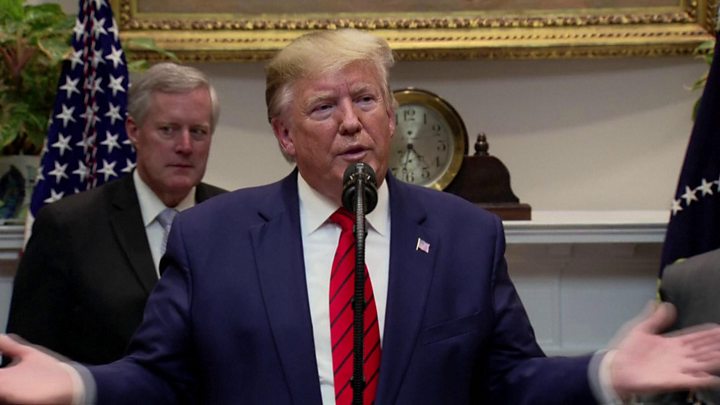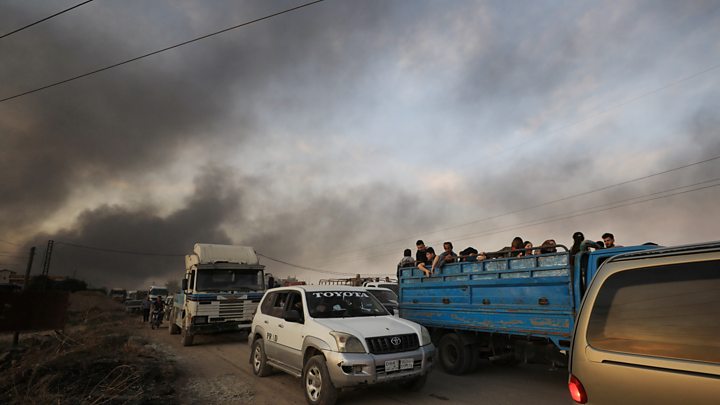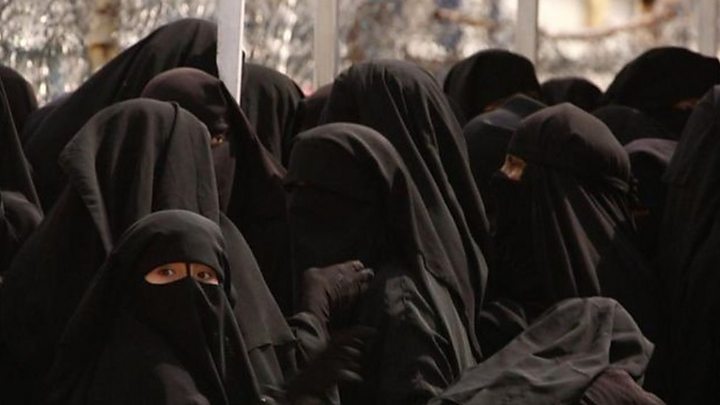Home » Middle East »
Turkey Syria offensive: Your questions answered
Turkish forces have entered Kurdish-held areas of northern Syria.
As smoke billows in border areas and tens of thousands flee their homes, many are wondering what lies ahead.
The situation is complex, with a wide range of players holding conflicting interests.
We asked you to send us your questions, so we could fill in the gaps and make things a little clearer.
Paul Adams, diplomatic correspondent, replies: Unfortunately yes. North-eastern Syria is ethnically mixed, with Kurds in a majority in some areas, and Sunni Muslim Arabs the majority in others. Add to that a smattering of smaller groups, including some Christians. The UN estimates that Turkey’s 2018 incursion into the mostly Kurdish Afrin region (further west) displaced 137,000 people. As the latest operation began on Wednesday, thousands of Kurdish civilians began to flee border towns.
If Turkey’s President Recep Tayyip Erdogan is genuinely determined to settle as many as 2 million Syrian refugees in newly captured territory along the border, this could significantly alter the demography of the region. For his part, Mr Erdogan says the operation aims merely to restore the region’s demographic structure and send Syrians back to their homes.
Paul Adams, diplomatic correspondent, replies: There’s evidence that the Kurdish-led Syrian Democratic Forces (SDF), dominated by the YPG, were already pulling back from some border areas ahead of Wednesday’s launch of Operation Peace Spring. But there was no sign of a wholesale withdrawal, and civilians were being urged to resist the Turkish advance. Reports since Wednesday have been patchy, so it’s hard to know how hard the Kurds are fighting.
It’s likely that in some places at least the SDF will have chosen tactical retreat over confrontation with a much more powerful enemy. But Turkey is determined to secure President Erdogan’s buffer zone, which simply can’t be done without a significant, long-term military operation.
Paul Adams, diplomatic correspondent, replies: It’s logic of the coldest kind. The US-Kurdish alliance was forged over the battle to repel Islamic State (IS). It began at Kobane in late 2014 and continued all the way to the defeat of IS at Baghouz in March this year. It’s never really been about anything else. Donald Trump believes the job has been done (many, including his own military chiefs, disagree) and that the US no longer has any business being in north-east Syria.
More broadly, the Kurds – stateless and spread across Syria, Turkey, Iraq and Iran – have long felt that when it comes to the politics of their host countries, and the machinations of the Great Powers, their interests are inevitably ignored.
Paul Adams, diplomatic correspondent, replies: Good question. This seems to be a big part of what President Erdogan is trying to achieve. Having hosted millions of Syrian refugees for so many years, he is understandably anxious to find alternative solutions. But this effort could run into all sorts of problems.
Are the refugees in question, who come from other parts of Syria, willing to go back to a part of the country they don’t know and where they don’t really belong? If they’re not willing, is it even legal to force them? What will be the effect on the existing Kurdish and Sunni Arab populations? Are the new arrivals simply going to swap one refugee camp for another? Who, if anyone, will be willing to build homes for them. And finally, what will the long-term demographic and political impact be of such a major piece of social engineering? It’s safe to say that such an undertaking is fraught with difficulties.
Paul Adams, diplomatic correspondent, replies: This is what an awful lot of people, including the Kurds and members of Donald Trump’s Republican Party in the US Congress, are saying. Donald Trump says IS is finished. Very few people agree with him. Can this particular battle, against an ideology as well as a movement, ever really be “over”? There’s no easy answer. But there’s no doubt that Donald Trump will face a lot of criticism if IS makes a significant comeback.
James Robbins, diplomatic correspondent, replies: To the first part of your question, I would suggest that some countries in “the West” will support the Kurds in words, but not with much, if any, action. The Kurds are in the tragic position of being an enormous ethnic group without an independent nation state to call their own… With nationhood comes power. Without nationhood, other nations who have already carved up a region, or have had it carved up for them in the past by colonial powers, are extremely unlikely to cede territory to make space for the creation of a new one.
To the second part of your question, I would suggest the likelihood of sanctions against Turkey is very small. That could change if overwhelming evidence were to emerge of grave breaches of the laws of war or of humanitarian law by Turkey.
James Robbins, diplomatic correspondent, replies: In theory, they could. They most certainly won’t, because they have neither the strength of purpose nor the necessary military might to enter an arena where the United States itself has already ceded dominance to the other substantial nuclear power, Russia. From the very beginnings of the uprising against Syrian President Bashar al-Assad, the United States and its Western allies have been far more willing to offer “moral” support rather than full-on military support to what they regard as legitimate, non-jihadist opposition groups or forces. At least part of that reluctance stemmed from acute Western failure in Afghanistan and in Iraq.
Russia’s decisive military intervention on President Assad’s side in September 2015 left the United States struggling to try to ensure its forces, on land and particularly in the air, did not end up in a shooting war with Russia. No lesser power would even contemplate taking the positions in Syria the Americans are gradually vacating.
James Robbins, diplomatic correspondent, replies: No, far from it. One strength of the United Nations is that its membership is made up of almost every nation state in the world. But that fact also explains its inevitable weakness too. Groups of countries, whole regions or alliances often combine their influence to push through – or to block – proposals on the basis of their own interests. That’s conventional politics, after all. But the real power in questions of peace and security – and this is one of those – rests with the United Nations Security Council. Within that council most of the power lies with the five permanent member states (the US, China, Russia, France and the United Kingdom). They are the only ones who can, individually, simply veto a decision (resolution) even though it may have the necessary support of a minimum of nine of the total membership of 15.
It’s very difficult to imagine much agreement at the level of the Security Council in this case. Will the United States or Russia agree to any language condemning Turkey’s actions? That seems very unlikely. But equally, there will be no agreement to do or say anything which supports Turkey.
Gordon Corera, security correspondent, replies: The simple answer is because the countries have not wanted to take them. The US has been pushing European countries to take them but they have been reluctant. They would need to be put on trial but there is often a lack of evidence that would be admissible in court. The fear is that they might then be released. The result is the problem has been deferred but now facts on the ground may force change.
David Gritten, Middle East Online, replies: Before Turkey launched the offensive, a Syrian foreign ministry source said the government was determined to confront Turkish aggression “by all legitimate means”. “The hostile behaviour of Erdogan’s regime clearly shows Turkish expansionist ambitions in the territory of the Syrian Arab Republic,” the source told the state news agency. The source added that the government was “ready to embrace all of its misled citizens if they return to the righteous road in a way that would guarantee Syria’s unity and territorial integrity”, in an apparent reference to the Kurds and their allies.
President Assad has previously vowed to retake “every inch” of Syrian territory, whether by negotiations or military force. His government has also rejected Kurdish demands for autonomy, saying that “nobody in Syria accepts talk about independent entities or federalism”.
Source: Read Full Article






